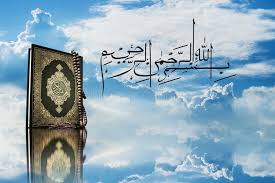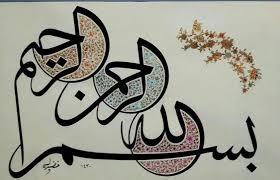In The Name of Allah, The Most Gracious, The Most Merciful

In the Name of Allah, the most gracious, the most merciful
بِسْمِ اللّٰهِ الرَّحْمٰنِ الرَّحِیْمِ
Beginning in Allah’s name, the most gracious, the most merciful. I begin this work in the name of Allah or ask for help in His name. I seek the Mercy of Allah. He is the beloved God who is worshipped. He is the God who is loved and obeyed. Hearts are drawn to the Merciful One, characterized by vast Mercy. Rahman shows Mercy to his creatures.
I begin this work in the name of Allah and His memory. I am starting in the name of Allah, the Most Gracious and Merciful. Allah’s remembrance and names are undoubtedly sacred.
Allah is an Arabic word that means God, Lord, the greatest and only creator of the universe. According to Muslims’ belief, Allah is the only one, and there is no god worthy of worship except Him. Allah is believed to be a kind, loving, and just God who is always present and ready to help His creatures.
Fundamental Beliefs of Islam:
Islam is a monotheistic religion founded by Prophet Muhammad (peace be upon him) in the Arabian Peninsula in the 7th century. The central text of Islam is the Holy Qur’an, which Muslims believe is the word of God revealed to the Prophet Muhammad (peace be upon him).
The teachings of Islam are based on the Holy Quran and Hadith, which are the sayings and deeds of the Holy Prophet (peace be upon him).
The fundamental beliefs of Islam include faith in Allah as the one and only God and in God’s prophets and messengers, including Adam, Noah, Abraham, Moses, Jesus, and Muhammad (peace be upon him). And faith in all of them. On the Day of Resurrection, all human beings will be held accountable for their deeds.
The Five Pillars of Islam are the foundation of Muslim practice and include a declaration of faith (Shahadah), prayer (Namaz), charity (Zakat), fasting (Soom), and the Hajj (Hajj). The commandment of trust is Islam’s first and most important pillar, affirming that there is no God but Allah and Muhammad (peace be upon him) is His Messenger.
Prayer is the second pillar of Islam and involves performing five prayers at specific times throughout the day. Muslims face the Kaaba in Mecca during prayer and recite verses from the Holy Qur’an. Charity is the third pillar of Islam and involves giving a portion of one’s wealth to needy people.
Fasting during Ramadan is the fourth pillar of Islam, during which Muslims abstain from food and other bodily needs from dawn to sunset. The pilgrimage to Mecca, also known as the Hajj, is the fifth pillar of Islam and a once-in-a-lifetime obligation for all physically and financially able Muslims.
Muslims also follow several moral and ethical principles, such as honesty, kindness, justice, and compassion. Muslims are encouraged to treat all human beings with respect and live a life of moderation, avoiding excessive materialism and indulgence.
The history and culture of Islam span fourteen centuries and have significantly influenced the world in various fields, including science, art, literature, and philosophy. Today, Islam is the second-largest religion in the world, with more than 1.8 billion adherents. Allah and the practice of Islam provide guidance and meaning to millions worldwide.
The Islamic faith emphasizes the importance of living a life of purpose, compassion, and service to others. May Allah Ta’ala guide us on the right path and bless us with His Mercy and forgiveness, Amen.
Therefore, Allah Ta’ala gave His Prophet (peace and blessings of Allah be upon him) whatever literature and teachings He deemed necessary as a Sunnah and a way for the creatures to follow it when starting all their affairs, writing letters and books, and performing their duties first.
Recite the name of Allah while following this method. Islam and its teachings are not limited to mosques and madrassas; they are a comprehensive and systematic way of life that applies to every Muslim’s life. Every aspect of a Muslim’s life should follow the religion.
That is why the Messenger of Allah (peace be upon him) has told the Ummah simple ways of living: by doing every action, every worldly work follows the religious teachings, which is rewarded.
In this way, every act of man becomes worship. By doing that, he attains nearness to Allah Ta’ala. and escapes from the Devil. And by not doing so, he will not deprive anyone but himself.
In Dar al-Muntazhar, Ibn Abbas, May Allah Ta’ala. be pleased with him, narrates that the Messenger of Allah,(peace be upon him), said that the people are unaware of the blessings of a verse of the Holy Qur’an that was not revealed to anyone except Sulaimon and me, (peace be upon him): “In the name of Allah is the Most Gracious, the Most Merciful.”
-بِسْمِ اللّٰهِ الرَّحْمٰنِ الرَّحِیْمِ
Translation: In the name of Allah, the most gracious, the most merciful.
Interpretation and Significance:
“بِسْمِ اللّٰهِ الرَّحْمٰنِ الرَّحِیْمِ” “(Bismillah al-Rahman al-Raheem)” In the name of Allah., the Merciful, the Most Merciful. Therefore, all Muslims should start doing good and righteous work. “In the name of Allah, the Merciful.”
Bismillah al-Rahman al-Raheem is an Arabic word used by all Muslims worldwide who speak any language. It is a part of the Holy Quran and comes before every Surah except Surat al-Tawbah. It has been mentioned twice in Surat al-Namal and 114 times in the Holy Quran. It is also called Bismillah and Tasmia in short. Muslims read it before starting any work.
A part from Arabic is also read as one word in other languages. Bismillah was often written on the doors of old buildings and houses for blessing. Muslims have used it extensively in calligraphy, and thousands of written Bismillah are found on old books, manuscripts, and buildings. According to Islamic traditions, reciting it before starting any work is recommended.
It was often written on the first page of old books, and one innovation after another was adopted. That is also the first sentence of the Holy Quran. Therefore, this is an essential word in Islamic society.
Study of the Holy Quran reveals that people of various religions have copied the subject of this verse since ancient times. These eloquent words may have been revealed for the first time in the Holy Quran, but as far as their issue is concerned, they are so suitable and appropriate for the beginning and opening of a work that the heart bears witness that Allah Ta’ala has taught them.
Man would have been given at the very beginning. Therefore, the Holy Qur’an mentions Hazrat Nuh (A.S), who said similar words when he led his faithful relatives and companions into the boat. Similarly, Hazrat Sulaiman (A.S) began his letter to the Queen of Saba with the exact blessed words.
This word is not a message, but as Surah Fatiha, it is a dua. It is a natural sound of the heart of a sane man that should come out of his tongue when doing any remarkable work. This natural sound has been clothed in words by divine revelation in such a beautiful cloth that no more beautiful fabric can be imagined. trusted source
When this dua comes out of the tongue with intention and consciousness before doing any work, it warns the person at the very first step that the work he will do is disobedience to Allah Ta’ala and rebellion against Him. It should not be but according to His will and under His orders.
Secondly, with the blessing of this prayer, he gets the support of two great attributes of Allah Ta’ala, Rahman, and Raheem. These two things guarantee that Allah Ta’ala. Bless him in this work; if he has made any mistake in adopting it, protect him from its evil, wash it, and bring it to completion.
May He give him the power of illusion, keep him safe from Satan’s tricks and deceptions, and make this work beneficial and blessed For him in this world and the hereafter; it will become a means of obtaining God’s pleasure.
The job done without this dua is devoid of all these blessings; that is why the Holy Prophet (peace and blessings of Allah be upon him) said that any work that is not started with the name of Allah Ta’ala., the Merciful, the Merciful, is without blessings.
These blessings of Bismillah appear with every work, but some other aspects should be kept in mind when starting the recitation of the particular Holy Quran with this prayer.
First, by starting the recitation of the Holy Qur’an with the name of Bismillah, the Most Merciful, the servant obeys Allah Ta’ala.‘s order to the Prophet of Islam when He revealed the very first revelation: Read in the name of your Lord, Who created. Secondly, this holy word reminds us that the most excellent favour of Allah Ta’ala. to man is that He gave him speech and speech, thanks to which he became worthy of the blessing of the Holy Qur’an.
This fact is indicated by Allah Ta’ala.‘s attribute, Rahman, which is referred to in this verse. In another place, it has been clearly stated that Allah’s Mercy created man, gave him the ability to speak, and taught him the Holy Qur’an.
Third, this verse confirms a specific prophecy concerning the Holy Prophet (peace be upon him) and the Holy Qur’an documented in previous heavenly scriptures. The education you will give to God’s people will be provided in the name of Allah—chapter 18 of the fifth book of Hazrat Musa (peace be upon him). These words are included in (18. 19).
Fourthly, just as the Holy Quran manifests Allah Ta’ala‘s attribute of Mercy, so is His attribute of Mercy, which is the key to the victory chapter in the Holy Qur’an. With that, the closed doors of Allah. Will be opened for His servants. Difficulties will be easy, and with the help of that, they will be protected from perversion, misguidance, and the calamities of the self and the Devil.
Names of the excellent verse:
This verse mentions three names of “Allah Ta’ala”: Allah, Rahman, and Raheem. Their meanings are briefly listed here.
The personal Name of “Allah.”
The name “Allah” is formed by inserting the definition alif-Lam into the word Allah. From the beginning, this name has been superior and exceptional only to Allah, the Highest, the creator and owner of the heavens, earth, and all creatures.
Before all acts of worship were obligatory, Allah ordered the Ummah and followers of the Holy Prophet (peace be upon him) to recite the name of Allah so that their souls gain light insight and access to divine knowledge, which is the soul and foundation of all acts of worship.
Only after this foundation of religion was strengthened were outward acts of prayer imposed on them. Surah Al-Muzamil, Surah Al-A’la, Surah Araaf, Surah Kahf, and Surah Taha were revealed in Makkah before Ibadah became obligatory. In all of them, the mention of Allah is ordered, and the method is also explained.
Allah has mentioned His ‘personal’ Name Allah to man because it covers all His attributes, and the most powerful of all His Name is ”Allah”. This name of Allah has so much power that if the word ”Allah” is placed in one part of the scales and the whole universe, heaven, and Hell are set in the other, the part with the name Allah will be heavier.
By mentioning Allah’s name, the soul receives the light of insight necessary for seeing God. The soul becomes so strong that it can break through all the veils of the body and soul and attain the vision and knowledge of Allah Ta’ala even before physical death.
Since the remembrance of Allah Ta’ala is the basis of the human goal of life, i.e., the attainment of divine wisdom, the first revelation and order from Allah Ta’ala to the Holy Prophet was to mention the personal name of Allah.
اِقۡرَاۡ بِاسۡمِ رَبِّکَ الَّذِیۡ خَلَقَ۔ العلق- 01
Translation:
Read in the name of your Lord (Ism Allah), Who created the creation.
The inner man within the material body is a living being that demands human attention. Just as the right food is necessary for the health of the earthly body, so is the food of the inner being, by which it feels calm, healthy, and energetic and gains strength. Allah Almighty says in the Holy Quran, except with the zikr of Allah Ta’ala, there is the assurance of the Holy Qur’an.
اَلَا بِذِکۡرِ اللّٰہِ تَطۡمَئِنُّ الۡقُلُوۡبُ ط (الرعد۔28)
Translation:
Verily, only by “Zikr Allah” do the hearts get satisfaction and peace.
That is, by mentioning the name of Allah, the human heart or soul gets peace because this is the source of its sustenance and strength. As Allah Almighty says, a person who turns away from this remembrance does not get the necessary food and care for his life and power.
وَ مَنۡ اَعۡرَضَ عَنۡ ذِکۡرِیۡ فَاِنَّ لَہٗ مَعِیۡشَۃً ضَنۡکًا وَّ نَحۡشُرُہٗ یَوۡمَ الۡقِیٰمَۃِ اَعۡمٰی – طٰہٰ -124
Translation:
“Indeed, whoever turns away from our remembrance, we will make his (inner) sustenance difficult, and we will raise him blind on the Day of Resurrection.”
In this blessed verse, sustenance refers to inner supervision because Allah Almighty has given a lot of maintenance to disbelievers and polytheists who do not mention Allah at all.
The cause of man’s loss in this world and the Hereafter is his neglect of the remembrance of Allah. Without Allah, his soul does not get the strength to tear the veil of the soul and take it to the place where it is. He will see and know God, Allah says in the Holy Quran.
یٰۤاَیُّہَا الَّذِیۡنَ اٰمَنُوۡا لَا تُلۡہِکُمۡ اَمۡوَالُکُمۡ وَ لَاۤ اَوۡلَادُکُمۡ عَنۡ ذِکۡرِ اللّٰہِ ۚ وَ مَنۡ یَّفۡعَلۡ ذٰلِکَ فَاُولٰٓئِکَ ہُمُ الۡخٰسِرُوۡنَ۔المنافقون -9
Translation: O you who believe, do not let your wealth and your Descendants neglect you from the remembrance of Allah. Those who do so are the losers.
All the creatures of Allah Ta’ala are glorified and mention different names of Allah as He says in the Qur’an.
تُسَبِّحُ لَهُ السَّمٰوٰتُ السَّبْعُ وَ الْاَرْضُ وَ مَنْ فِیْهِنَّؕ-وَ اِنْ مِّنْ شَیْءٍ اِلَّا یُسَبِّحُ بِحَمْدِهٖ وَ لٰكِنْ لَّا تَفْقَهُوْنَ تَسْبِیْحَهُمْؕ-اِنَّهٗ كَانَ حَلِیْمًا غَفُوْرًا – بنی اسرآءِیل ۔44
Translation:
The seven heavens, the earth, and everything in them glorifies Him, and there is nothing among the creatures that glorifies Him with His praise, but you are not aware of their glorification.
فَسَبِّحْ بِاسْمِ رَبِّکَ الْعَظِیْمِ – سورۃ حاقتہ – مکی):52 سورۃ واقعہ ( مکی – 96 اور 74
Translation:
So glorify the name of your Lord Almighty. (name of Allah).
سَبِّحِ اسۡمَ رَبِّکَ الۡاَعۡلَی – سورۃ اعلیٰ ۔01
Translation: Glorify the name of your Lord (Ism-i-Allah), who is the Highest. – Surah Al-Aa’la
وَ اذۡکُرِ اسۡمَ رَبِّکَ وَ تَبَتَّلۡ اِلَیۡہِ تَبۡتِیۡلًا ؕ – مزمل ۔8
Translation: And remember the name of your Lord (Ism-i-Allah) and turn away from all others and towards Him.
اِنَّنِىٓ اَنَا اللّـٰهُ لَآ اِلٰـهَ اِلَّآ اَنَا فَاعْبُدْنِىْۙ وَاَقِمِ الصَّلَاةَ لِـذِكْرِىْ – 14
Translation:
I am God; there is no god but Me, so worship Me and establish prayer for remembrance. (14)
وَاذْکُرْرَّبَّکَ فِیْ نَفْسِکَ تَضَرُّعًا وَّ خِیْفَۃً وَّ دُوْنَ الْجَھْرِ مِنَ الْقَوْلِ بِالْغُدُوِّ وَالْاٰصَالِ وَلَا تَکُنْ مِّنَ الْغٰفِلِیْنَ – اعراف ۔205
Translation:
And remember your Lord in the morning and in the evening, in your heart, through your breath, without making a sound, in secret, with humility, and do not be among the heedless. (Araf. 205)
اُدۡعُوۡا رَبَّکُمۡ تَضَرُّعًا وَّ خُفۡیَۃً ؕ اِنَّہٗ لَا یُحِبُّ الۡمُعۡتَدِیۡنَ – اعراف ۔55
Translation:
Secretly remember your Lord with humility. Verily, Allah does not like those who transgress. (Al-A’raf. 55)
To enjoin the remembrance of Allah in secret means to recite without sound and to enjoin the dhikr through the breath because the breath is related to the soul. As soon as the soul enters the body, the body starts breathing, and as soon as the soul leaves the body, the body stops breathing. Therefore, mentioning the name of Allah through the breath is the source of strength of the soul or inner man.
The holy Prophet, peace be upon him, said:
قَالَ النَّبِيُّ صَلَّى اللهُ عَلَيْهِ وَسَلَّمَ: «مَثَلُ الَّذِي يَذْكُرُ رَبَّهُ وَالَّذِي لاَ يَذْكُرُ رَبَّهُ، مَثَلُ الحَيِّ وَالمَيِّتِ
Translation:
The Holy Prophet, peace be upon him, said: The example of one who remembers his Lord and one who does not remember his Lord is like the living and the dead.
In other words, the breath in which Allah is mentioned is the cause of the soul’s life. That is why the Prophet (peace be upon him) said:
عن أبي موسى الأشعري رضي الله عنه عن النبي صلى الله عليه وسلم قال:
«مثل الذي يذكر ربه والذي لا يذكره مثل الحي والميت» وفي رواية: « مثل البيت الذي يُذْكَرُ الله فيه، والبيت الذي لا يُذْكَرُ الله فيه، مثل الحيِّ والميِّت ».
[صحيح] – [متفق عليه]
A person who remembers and does not remember Allah is like the living and the dead. (Bukhari and Muslim)
On the authority of Abu Musa al-Shaari, may God be pleased with him, on the source of the Holy Prophet, peace be upon him, who said: “Like the one who remembers his Lord and the one who does not remember him, like the living and the dead.”
[saheeh] – [muttafiq alaih] [صحیح] – [متفق علیہ]
Translation:
On the source of Abu Musa Ash’ari, may Allah be pleased with him, the holy Prophet of Allah (peace be upon him), said: “The example of a person who remembers his Lord and one who does not remember Him is like that of the living and the dead.” In another narration: “The example of a house in which Allah is remembered and in which Allah is not remembered is like that of the living and the dead (deserted).”
[saheeh] – [muttafiq alaih] [صحیح] – [متفق علیہ]
Rate: شرح :
Meaning of the Hadith: The person who remembers Allah Almighty burns his heart with the blessing of his remembrance and gives satisfaction to his chest. Therefore, he becomes like a living person due to the memory of Allah and his observance, unlike a person who does not remember Allah.
Therefore, such a person is like a dead person without existence. He is physically alive but spiritually dead. A man should take a lesson from this example, and he should know very well that whenever he neglects the remembrance of Allah the Exalted, hardness will arise in his heart, and maybe his heart is dead.
Allah the Exalted says:
وَمَن كَانَ مَيْتًا فَأَحْيَيْنَاهُ وَجَعَلْنَا لَهُ نُورًا يَمْشِي بِهِ فِي النَّاسِ كَمَن مَّثَلُهُ فِي الظُّلُمَاتِ لَيْسَ بِخَارِجٍ مِّنْهَا
Translation:
“A person who was dead before, then We gave him life and such a light that he walks among the people who took it. Can such a person be like a person who is in darkness?” Can’t get out of it?
As Allah Ta’ala said:
فَاِذَا قَضَیۡتُمُ الصَّلٰوۃَ فَاذۡکُرُوا اللّٰہَ قِیٰمًا وَّ قُعُوۡدًا وَّ عَلٰی جُنُوۡبِکُمۡ ۚ – النساء۔103
Translation:
Then, when you have finished praying, remember Allah while sitting and lying on your knees.
In this blessed verse, lying on the crotch refers to sleeping, and reciting only through the breath while sleeping is possible.
Before the revelation of the Qur’an, this name had the same meaning in Arab Jahiliyyah. Even though the Arabs were polytheists, they did not consider any of their gods equal to Allah.
He has subdued them, and He is the Water-giver and Sustainer. They used to worship other gods only based on this wrong assumption, which ended forever after the declaration of the prophecy of the Holy Prophet Muhammad (peace be upon him) that they were close to Allah and interceded with Him.
The Holy Quran describes his thoughts in great detail. We quote only two or three verses here for brevity. In the same way, they considered Allah Almighty the source and centre of all powers and abilities, all life and death, and all the order and order of the universe.
Attributes of Rahman and Raheem:
Rahman and Raheem are two attributes of Allah Ta’ala. The meaning is that Rahman is the one who bestows blessings, the one who gives a lot of mercy, and the importance of Raheem is the one who says a lot of mercy.
The word al-Raheem has appeared 34 times in the Qur’an.
163 وَإِلَٰهُكُمْ إِلَٰهٌ وَٰحِدٌ لَّآ إِلَٰهَ إِلَّا هُوَ ٱلرَّحْمَٰنُ ٱلرَّحِيمُ – البقرة
Transition:
And your God is One God; there is no (true) God besides Him; he is Merciful (in this world and the Hereafter).
–الرَّحْمَٰنِ الرَّحِيمِ
Most Kind, Most Merciful.
From the commentaries of some Salaf, it is also known that the words of Jesus (peace be upon him) based on these meanings have already been passed that «الرَّحْمَٰنِ» “Al-Rahman” means the Merciful in this world and the Hereafter, and «الرَّحِيمِ» “Al-Raheem” means the Merciful in the Hereafter. Al-Rahman and Al-Raheem: الرَّحْمَٰنِ اور الرَّحِيمِ:
Both names are derived from Rahmat, and both are synonyms of the word exaggeration, but in Rahman, the exaggeration is more than that of Raheem due to the word excess. Rahman means one who has general Mercy on all. The meaning of Raheem shows special Mercy. Water, air, health, rain, and sunlight have been given to all without distinction.
But faith, guardianship, prophethood, government, and worship were not given to all but were given to special ones. Friends, enemies, believers, infidels, and cowards are all blessed with His Mercy. But in the Hereafter, Mercy and grace will be only for those who believe. Punishment will be inflicted on the disbelievers and polytheists. This attribute is the appearance of Mercy.
Attribute Raheem:
Al-Raheem means His Mercy will be granted only to those to whom He wills Mercy. Moreover, they will be believers, as scholars say. ھُوَ رَّحْمَٰنِ الدنیا اور رَّحِيمِ الاخرۃ: He is the Most Merciful in this world and the Most Merciful in the Hereafter, that is why the word Merciful is not reserved only for Allah (the Messenger of Allah (peace and blessings of Allah be upon him) is the Most Merciful in the Believers).
All the outward and inward blessings of the believers are proofs of the Mercy of Allah—for example, peace and security, health and wealth, children, food and drink, etc. But in the Hereafter, the Mercy of Allah will be unique only with the people of Tawheed. Al-Rahman (Forgiving, Merciful) These two are derived from the word Rahmat, and Mercy refers to the tenderness of the heart, which requires grace and kindness. Still, it should be remembered that the names of Allah, the Almighty, begin with words and attributes. There is no consideration, but the end and the meaning are considered (the end of Mercy is kindness).
Ibn Abbas says that these two nouns refer to kindness, and there is excess and exaggeration of each other. Allah is called Rahman-ud-Dunya wa Raheem-ul-Akhira ھُوَ رَّحْمَٰنِ الدنیا اور رَّحِيمِ الاخرۃ because Mercy is only the portion of the dead in the Hereafter (only believers will benefit from Mercy in the Hereafter, and all people will help in this world. Believers and disbelievers alike). Sometimes, this excess is just in terms of status; in this sense, Allah is called Rahman dunya wal akhirah wa Raheem dunya because all the blessings of the hereafter are precious.
Some blessings of this world are despicable, and some are Jalil-ul-Qadr because the word Rahman is like an expression of Allah Almighty. It is specific; that is why the word Raheem has been given priority. The second reason is that Mercy is a priority in time, and in general, Mercy is a priority worldwide.
It should be remembered that the one who truly gives blessings belongs to Allah Ta’ala. He is the only one who does not ask for His Mercy; every small, big, outward, inner, physical, spiritual, worldly, and hereafter blessing is given by Allah Ta’ala.
The blessing that reaches a person in this world is only by the Mercy of Allah Almighty because creating a feeling of Mercy in one’s heart gives the power to show Mercy, bringing the blessing into existence, benefiting others from it, and benefiting from it. Granting the safety of the limbs to lift, all this is from Allah Ta’ala.
For this reason, none of these attributes is an attribute of Bayt, but one shows enthusiasm for Allah’s Mercy, and the other shows its continuity. If you think about it, you will know that God’s Mercy is exact on these people. There is not only excitement in it but also durability and stability. That does not mean Allah Ta’ala created the world in the zeal of His Mercy, but He neglected its notice and care after creating it. Whenever a servant calls upon Him, He hears His call and honourably accepts His supplications.
Then His Mercy is not limited to these few days of life, but for those who will continue to follow the path that He has told them, His Mercy will be on them in an eternal life that will never end. If you think about it, you will know that this whole truth cannot be revealed until these two words together reveal it.
The position and status of this verse in the Qur’an:
An important question about this verse also arises: Where is its original place in the Holy Qur’an? This question arises because it is written as a continuous verse at the beginning of every Surah, except Surah Towbah. Still, in any Surah, except Surah Nimal, it is a part of it. It needs to be included.
For this reason, there is a difference of opinion as to whether it is also part of a particular sura or is recorded above each sura only as a blessed beginning and a sign of distinction.
The readers and jurists of Madinah, Basra, and Syria believe this verse is not in any of the Qur’an’s Surahs, including Surah Fatiha. It is written simply as a blessing and symbolizes the harvest at the beginning of each Surah.
It distinguishes one Surah from another, and the reciter also receives blessings when he opens a surah with it. That is the belief of Imam Abu Hanifa (may Allah have Mercy on him).
On the contrary, the jurists of Makkah and Kufa, as well as the Shia scholars and jurists, believe this is a verse of Surah Fatiha and other surahs. That is the belief of Imam Shafi’i and his companions.
Imam Maulana Hameeduddin Farahi (may Allah have Mercy on him) calls it a verse of Surah Fatiha and Fatiha for other surahs. That is because the current arrangement of the Mushaf is based on all divine revelations and the guidance of the Messenger of Allah (peace and blessings of Allah be upon him).
In this order, as far as the nature of writing Bismillah is concerned, no difference has been made between Surah Fatiha and other Surahs. Still, it is written similarly at the beginning of each Surah. Its status is a permanent verse separate from the Surah.
Bismillah – Virtues of In the Name of Allah (Bismillah):
Bismillah (In the name of Allah) is the first word of the Qur’an. One of the Arabic names for the opening phrase of the Qur’an is Bismillah al-Rahman al-Raheem (“In the name of Allah, Most Merciful, Most Merciful”).
Like the daily sun, this verse also shines with new glory and brightness at the beginning of each chapter of the Qur’an. It is unsurprising that the Messenger of Allah, may God bless him and grant him peace, said: “Any important work that does not begin with Bismillah is devoid of blessings.”
Not only does the Holy Qur’an begin with this verse, but it also guides every chapter of the Quran except for Chapter 9. This verse is part of the Qur’anic revelation, and the Holy Prophet (PBUH) said: He said through this verse. Allah Ta’ala distinguished different chapters.
This verse is repeated and so profound that it is said that just as Fatiha (the first chapter of the Qur’an) summarizes the entire Qur’an, it also outlines the Fatiha. In other words, this verse is the summary of the Qur’an.
This word, Bismillah Rahmani Raheem, appears in 114 places in the Holy Qur’an at the beginning of every Surah except Surah Towbah or Al-Bara’ (Chapter 9). It occurs twice in Surah Al-Naml (Chapter 27)—the first in the beginning and the second in verse 30.
Revelation of Bismillah:
Hazrat Jabir Radiyallahu Anhu narrates that when: In the name of Allah, the Most Merciful, the Most Merciful. Came down, the clouds moved towards the east, and the winds ceased to blow. The seas became calm, the creatures became ready to listen, fire rained down on the devils from the sky, and Allah swore by His glory and declared. Whoever says this name of mine on anything, I will bless that thing.
(Dar al-Mutazir and Ibn Kathir)
Again, you can remember Allah by His 3000 names with this verse. It is mentioned in Tafsir Ruh al-Bayan that Allah has three thousand names. He has mentioned 1000 names of angels, 1000 prophets, 300 names of Allah, 300 names of Torah, 300 of Psalms, 300 of Injeel, and 99 of Allah in the Holy Quran. A name he kept to himself without revealing it to anyone. According to the scholars, all these are gathered in three names in verse.
Teaching children to say Bismillah can be a source of forgiveness for parents. Hazrat Abdullah Ibn Abbas (R.A) narrates that as soon as the teacher says to the child: In the name of Allah, the Most Merciful, the Most Merciful, then the teacher, the child, and the child’s parents are all guarantors of freedom from the fire of Hell.
There is a tradition that Jesus passed by a grave whose prisoner was tortured. After a few days, he again passed by the same grave. This time, there was no punishment. The prisoner was very relaxed.
That surprised him a lot. He asked Allah: O Lord, from what did Your Mercy come that You removed the punishment from this person? Allah, I replied: O Jesus, when that person died, he left behind a child. When his mother took him to the madrassa, the child said: Bismillah, Rahman, Raheem. Punishing his father in the teacher’s presence was inappropriate when he called me Rahman and Raheem, so I forgave him.”
Bismillah – the means of deliverance from punishment:
Abdullah bin Masoud narrated that this verse has 19 letters, and the angels of Hell are also 19. Whoever recites this verse will be protected from the 19 angels of Hell. Tafsir al-Qurtubi and Dar al-Mutar, Volume 1, page 9. Bismillah is a source of exaltation in the Hereafter:
The Messenger of Allah, may God bless him and grant him peace, said that a supplication begins with “Bismillah al-Rahman al-Raheem” is accepted.
By saying this, In the name of Allah, the Merciful, the Most Merciful, the split of my Ummah will be heavy on the Day of Resurrection. Others will ask why the virtues of Muhammad’s (peace be upon him) Ummah are so rich.
Their Prophets would reply: “In the words of the Ummah of Muhammad,(peace be upon him) In the name of Allah is so respected that if placed on one side of the balance and the sins of all creatures on the other side, that side would be heavier virtues.”
Note:
The content of this article has been obtained from various sources. If you find any error or misrepresentation, please notify us by commenting on the post or Contacting us.











